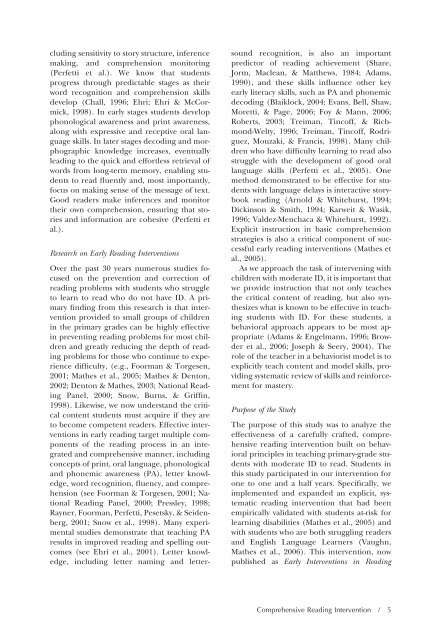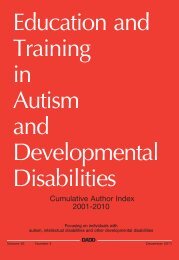Download The Journal (PDF) - Division on Autism and ...
Download The Journal (PDF) - Division on Autism and ...
Download The Journal (PDF) - Division on Autism and ...
Create successful ePaper yourself
Turn your PDF publications into a flip-book with our unique Google optimized e-Paper software.
cluding sensitivity to story structure, inference<br />
making, <strong>and</strong> comprehensi<strong>on</strong> m<strong>on</strong>itoring<br />
(Perfetti et al.). We know that students<br />
progress through predictable stages as their<br />
word recogniti<strong>on</strong> <strong>and</strong> comprehensi<strong>on</strong> skills<br />
develop (Chall, 1996; Ehri; Ehri & McCormick,<br />
1998). In early stages students develop<br />
ph<strong>on</strong>ological awareness <strong>and</strong> print awareness,<br />
al<strong>on</strong>g with expressive <strong>and</strong> receptive oral language<br />
skills. In later stages decoding <strong>and</strong> morphographic<br />
knowledge increases, eventually<br />
leading to the quick <strong>and</strong> effortless retrieval of<br />
words from l<strong>on</strong>g-term memory, enabling students<br />
to read fluently <strong>and</strong>, most importantly,<br />
focus <strong>on</strong> making sense of the message of text.<br />
Good readers make inferences <strong>and</strong> m<strong>on</strong>itor<br />
their own comprehensi<strong>on</strong>, ensuring that stories<br />
<strong>and</strong> informati<strong>on</strong> are cohesive (Perfetti et<br />
al.).<br />
Research <strong>on</strong> Early Reading Interventi<strong>on</strong>s<br />
Over the past 30 years numerous studies focused<br />
<strong>on</strong> the preventi<strong>on</strong> <strong>and</strong> correcti<strong>on</strong> of<br />
reading problems with students who struggle<br />
to learn to read who do not have ID. A primary<br />
finding from this research is that interventi<strong>on</strong><br />
provided to small groups of children<br />
in the primary grades can be highly effective<br />
in preventing reading problems for most children<br />
<strong>and</strong> greatly reducing the depth of reading<br />
problems for those who c<strong>on</strong>tinue to experience<br />
difficulty, (e.g., Foorman & Torgesen,<br />
2001; Mathes et al., 2005; Mathes & Dent<strong>on</strong>,<br />
2002; Dent<strong>on</strong> & Mathes, 2003; Nati<strong>on</strong>al Reading<br />
Panel, 2000; Snow, Burns, & Griffin,<br />
1998). Likewise, we now underst<strong>and</strong> the critical<br />
c<strong>on</strong>tent students must acquire if they are<br />
to become competent readers. Effective interventi<strong>on</strong>s<br />
in early reading target multiple comp<strong>on</strong>ents<br />
of the reading process in an integrated<br />
<strong>and</strong> comprehensive manner, including<br />
c<strong>on</strong>cepts of print, oral language, ph<strong>on</strong>ological<br />
<strong>and</strong> ph<strong>on</strong>emic awareness (PA), letter knowledge,<br />
word recogniti<strong>on</strong>, fluency, <strong>and</strong> comprehensi<strong>on</strong><br />
(see Foorman & Torgesen, 2001; Nati<strong>on</strong>al<br />
Reading Panel, 2000; Pressley, 1998;<br />
Rayner, Foorman, Perfetti, Pesetsky, & Seidenberg,<br />
2001; Snow et al., 1998). Many experimental<br />
studies dem<strong>on</strong>strate that teaching PA<br />
results in improved reading <strong>and</strong> spelling outcomes<br />
(see Ehri et al., 2001). Letter knowledge,<br />
including letter naming <strong>and</strong> letter-<br />
sound recogniti<strong>on</strong>, is also an important<br />
predictor of reading achievement (Share,<br />
Jorm, Maclean, & Matthews, 1984; Adams,<br />
1990), <strong>and</strong> these skills influence other key<br />
early literacy skills, such as PA <strong>and</strong> ph<strong>on</strong>emic<br />
decoding (Blaiklock, 2004; Evans, Bell, Shaw,<br />
Moretti, & Page, 2006; Foy & Mann, 2006;<br />
Roberts, 2003; Treiman, Tincoff, & Richm<strong>on</strong>d-Welty,<br />
1996; Treiman, Tincoff, Rodriguez,<br />
Mouzaki, & Francis, 1998). Many children<br />
who have difficulty learning to read also<br />
struggle with the development of good oral<br />
language skills (Perfetti et al., 2005). One<br />
method dem<strong>on</strong>strated to be effective for students<br />
with language delays is interactive storybook<br />
reading (Arnold & Whitehurst, 1994;<br />
Dickins<strong>on</strong> & Smith, 1994; Karweit & Wasik,<br />
1996; Valdez-Menchaca & Whitehurst, 1992).<br />
Explicit instructi<strong>on</strong> in basic comprehensi<strong>on</strong><br />
strategies is also a critical comp<strong>on</strong>ent of successful<br />
early reading interventi<strong>on</strong>s (Mathes et<br />
al., 2005).<br />
As we approach the task of intervening with<br />
children with moderate ID, it is important that<br />
we provide instructi<strong>on</strong> that not <strong>on</strong>ly teaches<br />
the critical c<strong>on</strong>tent of reading, but also synthesizes<br />
what is known to be effective in teaching<br />
students with ID. For these students, a<br />
behavioral approach appears to be most appropriate<br />
(Adams & Engelmann, 1996; Browder<br />
et al., 2006; Joseph & Seery, 2004). <str<strong>on</strong>g>The</str<strong>on</strong>g><br />
role of the teacher in a behaviorist model is to<br />
explicitly teach c<strong>on</strong>tent <strong>and</strong> model skills, providing<br />
systematic review of skills <strong>and</strong> reinforcement<br />
for mastery.<br />
Purpose of the Study<br />
<str<strong>on</strong>g>The</str<strong>on</strong>g> purpose of this study was to analyze the<br />
effectiveness of a carefully crafted, comprehensive<br />
reading interventi<strong>on</strong> built <strong>on</strong> behavioral<br />
principles in teaching primary-grade students<br />
with moderate ID to read. Students in<br />
this study participated in our interventi<strong>on</strong> for<br />
<strong>on</strong>e to <strong>on</strong>e <strong>and</strong> a half years. Specifically, we<br />
implemented <strong>and</strong> exp<strong>and</strong>ed an explicit, systematic<br />
reading interventi<strong>on</strong> that had been<br />
empirically validated with students at-risk for<br />
learning disabilities (Mathes et al., 2005) <strong>and</strong><br />
with students who are both struggling readers<br />
<strong>and</strong> English Language Learners (Vaughn,<br />
Mathes et al., 2006). This interventi<strong>on</strong>, now<br />
published as Early Interventi<strong>on</strong>s in Reading<br />
Comprehensive Reading Interventi<strong>on</strong> / 5

















